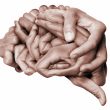Hands up if you’re frustrated!
Do you sometimes feel like your team isn’t responding in a way that you expect? Do you feel like you are never quite on the same page as your boss? Frustrated by lack of understanding? Are your emails to colleagues and clients going unanswered? Is your voice just not being heard?
No matter what industry you’re in, no matter what position you’re in, the term ‘communication’ can throw up a minefield of behaviours, interpretations and frustrations. Far too often, we assume everyone communicates, behaves and acts the same way as us. Worse still, we place an expectation on them to adapt their behaviour to our line of thinking.
Let’s imagine a scenario whereby every leader and to an extent, every employee, stopped for a second, took a breathe and said:
“It’s not about me”.
Imagine a scenario whereby everyone understood the importance of placing others at the forefront. Imagine a scenario whereby approaches were driven by a service mindset, a set of power skills that enabled us to improve on our own communication and as such establish connections based on trust and respect.
So how can you adopt the words ‘it’s not about me’ and use them to improve communication and subsequently connect better?
Learn to Listen
“We have two ears and one mouth so that we can listen twice as much as we speak”.
– Epictetus
The best way to get to know someone is to listen. Properly listen. Communication and connection is ineffective unless you know that person. So listen. By listening, I’m not referring to allowing them to gas for hours, I mean actually listen in order to understand them. It’s easy to jump the gun and read in between the lines before reading the actual lines. It’s easy to form an opinion based on what you think they’re saying in between the lines. Listen to the actual lines. Focus on their words and the manner in which they’re speaking the lines.
Listen more and talk less. Allowing yourself to be open-minded rather than forming opinions and judgments could, potentially present you with new ideas as well as picking up on issues before they multiply in size.
Understand body language
“Effective communication is 20% what you know and 80% how you feel about what you know”.
– Jim Rohn
So much can be said through body language rather than spoken words. Studies show that 55% of communication is done through body language, 38% is tone of voice and only 7% is actual words spoken.
Imagine if you could unravel someone’s posture, mannerisms and hand gestures how much it would tell you about the person you’re trying to connect and communicate with. Take a moment to try and zone into this. It’s a little tricky in the world of Zoom calls but even watching hand gestures and eye contact can tell you a lot about a person. If you detect nervousness, give them some breathing space. Even go so far as to do some research on the mannerism and try to understand it better. In doing so you’ll form a better understanding of the person and as such can adapt your approach to them. A small tweak in your mindset could lead to a huge spike in their positivity.
Cultivate self-awareness
“It takes considerable knowledge just to realise the extent of your own ignorance”.
– Thomas Sowell
If you want to ensure you can place yourself in the best possible position to advance through your career or lead effectively at the top, you need to cultivate awareness. Awareness not just of yourself but of others and situations too.
Self-awareness is understanding your own strengths, weaknesses, emotions, motivations and what you believe in and stand for. Of overriding importance, is also understanding how your behaviour and energy affects others. Everything links. Everything is connected. How you interact with others, how they see you, how you see them, how you react to situations – it’s all connected and self-awareness can enhance these connections.
Awareness of others is easy to sideline. You’re busy and multi-tasking, possibly jumping across multiple priorities. You need to stop and give someone your undivided attention. Don’t crash through them like a steam train. Allow them the space to ask questions, listen to understand and by doing so, your communication and connection will improve.
Situational awareness calls on your ability to perceive what’s going on in the present or the future. The more you can look up and observe, the better you can see and deal with the present and the future. Look down and you’ll exist in constant crisis management with limited communication and connections.
Be your authentic self & speak with honesty.
“The single biggest problem in communication is the illusion that it has taken place”.
– George Bernard Shaw
As tough as it might be, learn to agree to disagree with others. Be who you really are and allow yourself to communicate in a straightforward way. It is absolutely acceptable to have a different opinion to someone else without disliking each other. Learning to listen to another opinion and respect it even if you don’t agree with it is one of life’s greatest talents. So allow yourself to truly own up to what you want to say and then say it.
Follow the belief that honesty is indeed the best policy. Perhaps they don’t agree with you or your words don’t make an impression, but your honesty will. And, it’s your honesty that might form that connection. You won’t feel like you truly belong somewhere if you are not being honest.
Be empathetic
“To effectively communicate, we must realise that we are all different in the way we perceive the world and use this understanding as a guide to our communication with others”.
– Tony Robbins
Put yourself in someone else’s shoes and try to see the situation from their perspective. This is so important now as we juggle homeschooling, anxiety and so many ‘abnormal’ external factors. Could their personal circumstances be impacting their approach? Have you explained yourself succinctly and what you actually want from that person? Is your brief as clear as it could possibly be? To be an empathetic leader, you need to change your own mindset to allow yourself to put other people first.
People are human beings. They are not a means to an end. Everyone has a story and everyone’s story impacts their performance. Put yourself in their shoes and read their story. Give them the benefit of the doubt, check in with them because you want to not because you have to. By understanding them better, you’ll create stronger foundations from which successful communication will grow.
It’s always fascinating how few people ask questions. It costs nothing to ask a question and in doing so, you’ll draw out feelings and implications through the answers. Curious people who ask lots of questions have a far greater understanding of people around them. In information gathering, curious people are able to build stronger rapports and as such, deeper connections.
Life is full of communication. Our ability to communicate has a direct impact on all we do and all who we form connections with. John Maxwell wrote in his book Everyone Communicates Few Connect that “people cannot succeed in life without communicating effectively”. So very obvious but so very true. Understanding the impact of how we communicate and what we are communicating is vital to ensuring an end goal is achieved.
Not everyone communicates the same, but we do all communicate. So if you’re looking to build connections both with existing and new faces, then communicate effectively. If these connections aren’t happening, then ask yourself this: Are you making the connections you want? If you’re not, then why not? If you are, then why have they happened? Are you communicating in the most impactful way you can?













